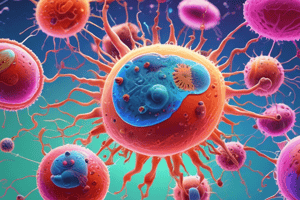Podcast
Questions and Answers
What characteristic makes viruses obligate intracellular pathogens?
What characteristic makes viruses obligate intracellular pathogens?
- They are visible under a light microscope.
- They depend on host cells for replication. (correct)
- They can survive outside host cells.
- They can grow in artificial media.
Which of the following accurately describes the structure of viruses?
Which of the following accurately describes the structure of viruses?
- Complex structures with multiple organelles.
- Made primarily of carbohydrates and lipids.
- Consist of a nucleic acid genome and protein shell. (correct)
- Always surrounded by a lipoprotein envelope.
Why are viruses considered highly specific?
Why are viruses considered highly specific?
- They target specific cells and organisms. (correct)
- They can infect multiple types of hosts simultaneously.
- They replicate outside of living cells.
- All viruses can attack both plants and animals.
What is a significant limitation in cultivating viruses?
What is a significant limitation in cultivating viruses?
What size range do viruses typically fall into?
What size range do viruses typically fall into?
What role do viruses play in human diseases?
What role do viruses play in human diseases?
Which of the following is a type of enzyme derived from viruses that is utilized in molecular biology?
Which of the following is a type of enzyme derived from viruses that is utilized in molecular biology?
What is one of the economic impacts of viruses in the agricultural sector?
What is one of the economic impacts of viruses in the agricultural sector?
How do some viruses contribute to pest control?
How do some viruses contribute to pest control?
What is the significance of studying some viruses beyond their role in disease?
What is the significance of studying some viruses beyond their role in disease?
Flashcards are hidden until you start studying
Study Notes
Overview of Virology
- Virology is a subfield of microbiology focusing on the study of viruses.
Characteristics of Viruses
- Viruses are small, measuring between 10 to 400 nanometers; invisible under light microscopes but detectable with electron microscopes.
- Structure is simple, primarily composed of a nucleic acid genome encased in a protective protein shell; may include a lipoprotein envelope.
- Classified as obligate intracellular pathogens, meaning they can only reproduce within living host cells.
Virus Replication
- After invading a host cell, viruses hijack the cell's machinery to produce new virus particles, showcasing their ability to self-replicate.
- Highly host and cell-specific; viruses exhibit strict specificity, such that a plant virus cannot infect animals, and viruses targeting specific organs (e.g., lungs) do not infect others (e.g., liver).
Cultivation of Viruses
- Viruses cannot be grown on artificial media (in vitro) and must replicate within a living organism (in vivo) to propagate.
Viruses and Disease
- Viruses are significant agents for various human diseases, with a spectrum ranging from mild illnesses like common colds to severe diseases such as rabies.
- Certain viruses contribute to the development of multiple cancer types, highlighting the necessity to comprehend their nature and replication processes.
- Understanding viral behavior is crucial for addressing the impact of diseases in veterinary virology and plant virology due to their economic consequences on livestock and agriculture.
Useful Applications of Viruses
- Some viruses are valuable for their practical applications in biology and industry.
- Enzymes from viruses, such as reverse transcriptases sourced from retroviruses and RNA polymerases extracted from bacteriophages, are essential tools in molecular biology research.
- Specific viruses, like baculoviruses, are employed as biopesticides to manage insect populations, while myxoma virus has been utilized effectively to control rabbit populations.
Studying That Suits You
Use AI to generate personalized quizzes and flashcards to suit your learning preferences.



